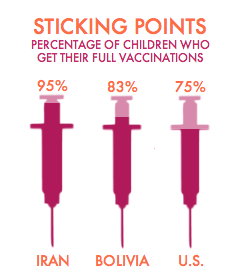
April 30, 2013 | War and Peace
“To change the world, start inside yourself.”
5 life lessons from a hero to war survivors, Zainab Salbi.

Twenty years ago, a 23-year-old newlywed college student saw horrifying newspaper images of rape camps in Bosnia—and decided she had to do something about it. So Zainab Salbi, an Iraqi-American, used the money intended for her honeymoon to start Women for Women International, now a globally respected nonprofit that works with survivors of war from Afghanistan to Congo and has distributed in excess of $100 million to more than 350,000 women. Salbi recently published her latest book, If You Knew Me You Would Care, and is working on a documentary about women and the Arab Spring.
1. You are defined not by what happened to you, but what you make of your story.
"From afar the world sees women refugees and survivors of war as victims. And though women do suffer much of wars atrocities from rape to displacements, they do not define themselves by their victimhood stories but rather by what they make out of the story. They have taught me about the real meaning of peace, and strength, and courage, and beauty and just to appreciate every aspect of life."
2. Peace is inside you.
"I met what I call my Dalai Lama in a Congolese woman named Nanbito, who lives in a small hut with a tin roof and four children; one is a result of rape. When I asked her what peace means for her, she said: 'Peace is inside my heart. No one can give it to me and now one can take it away from me.' Her wisdom is something we each seek in our privileged lives in the U.S.: that simple peace inside our hearts."
3. We can find love in the midst of horror.
"War is only a microcosm of life in peace. People fall in love in war, and get married and divorced, and have children and go to parties and lose loved ones. There are many challenges in wars but there are always moments when people find joy in the midst of much horror. The only way we can really connect to women survivors of war is not seeing them as different but seeing them as us. We are them. They are us. The lives are different. The feelings are the same."
4. There is great beauty in unexpected places.
"I have seen women who went through all sorts of horrors from child marriage, to rape and displacement, war and loss of loved ones and I have seen them rise and rise up again in the most magnificent ways. I met women in Afghanistan who built their lives from zero and now employee hundreds of other women and men in their business. I have met genocide survivors in Rwanda who have forgiven their loved ones' killers and now run organic farming to ensure a better future for their kids. This and more left me a belief in the beauty of this world and the beauty of humanity despite all of the darkness. If my sisters in Congo and Iraq can still sing and dance, who am I not to do so and not to be grateful for all my privileges."
5. To change the world, start with the inner journey.
"If we are to change the world, women's voices need to be heard loud and clear in all sectors and can no longer be corned into one sector only. But beyond that, we need to be the change we aspire to in the world. Such change starts with the inner journey. What drives me forward is my absolute and utter belief in the possibility of change and that it is indeed possible for each one of us to live our truth and fulfill our full potential."